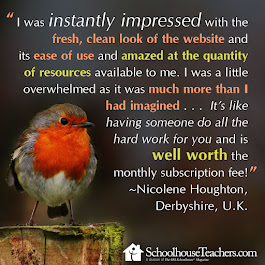
- Uncle Tom's Cabin - Harriet Beecher Stowe
- selected poems from Leaves of Grass - Walt Whitman
- short story "The Outcasts of Poker Flat" - Bret Harte
- Huckleberry Finn - Mark Twain
- selected poems - Paul Lawrence Dunbar
- The Red Badge of Courage - Stephen Crane
- selected poems - Emily Dickinson
- The Call of the Wild - Jack London
The poems and short stories are included in the Student's Guide, and you may buy the novels from Hewitt Homeschooling as a package or separately, or you may acquire them on your own. You may view the Table of Contents and a Sample Chapter (these links open pdf files). Lessons cover theme, humor, point of view, description, and figurative language. There are comprehension questions for each reading selection, as well as discussion questions and writing assignments. There are also project suggestions, and additional related reading suggestions, and information about each of the authors. The Teacher's Guide includes all the answers to the comprehension questions, teaching schedule, and grading aids. It comes three-hole punched but unbound, so I put it in a three-prong folder.
After getting an idea of what he was in for, Landon started reading the first novel assigned, Uncle Tom's Cabin by Harriet Beecher Stowe. This Unit, like each in the study guide, begins with background information about the author and the literary work itself. A lesson preview sidebar alerted him that the lesson would focus on theme, and a While You Read section advised him to keep some questions about the arguments presented against slavery in mind while reading the novel. The reading of the novel is assigned in sections. There are comprehension questions for each section that he needed to answer. When we got started, I thought that Landon would be able to follow the one-semester schedule since we wanted to get as far as possible during the time we had before writing this review, and he had very little else in the way of schoolwork at the time. It turned out that this pace was too challenging for a student that doesn't care a great deal for reading, and hasn't done this kind of deep literature study before. That means that he hasn't quite finished the novel, and has only just started on the writing assignments. For him, the full year schedule is a more realistic pace, and that is how he will finish the course.
As mentioned, the Literary Lesson for the Unit is Theme. The Student's Guide gives excellent explanation and examples from the book of how the characters communicate the strong central theme, how Stowe makes the most of the empathy the reader feels for the characters, and how the plot and setting are essential in conveying the central theme.

I was pleased with how well Landon understood the novel, as evidenced by his answers to the Comprehension Questions and his responses to the Discussion Questions given in the Teacher's Guide. He did have a little trouble with some of the more opinion-oriented questions about insights into the characters, but overall he liked how answering those questions focused his attention on various details and helped him recall what he read days or even weeks previous.
Each Unit also includes a variety of Writing Exercises. The author recommends choosing at least one of the exercises for the shorter selections (poems and short stories) and at least two of the exercises for each of the novels. The list of Writing Exercises for the first Unit had eight options to choose from! One of these is to write a short story to argue a point. I knew Landon wouldn't choose that one - he isn't a story-writer! He chose to write a paper about the arguments Stowe presents against slavery, citing the examples from the novel. His other selection is a character study of the one character in the book that he feels is the most noble. We're glad there are so many options for him to choose from, especially since writing doesn't come at all easily to him.
By the end of the course, a student will have read four important American novels, and several selections of shorter works and poetry by American writers. I believe the novels should be appealing to most boys, even those who are not avid readers, because they are essentially adventure stories. In addition, they will have been introduced to a couple of American poets, and will have written about a dozen papers analyzing and responding to the literature.
The Teacher's Guide gives lots of tips for grading student writing. The tips are specific to Nonfiction, Fiction, and Poetry writing assignments. There is a Checklist for grading each type of writing, and Grading Templates are included. As a parent, grading my own child's writing has always been a rather daunting task, so having specific items to look for and details about how to grade the different elements of a paper is so helpful! The Teacher's Guide is also the source for the Discussion Questions for each Unit.
I should also mention that we were introduced to the Lightning Lit series two years ago, when we reviewed the Grade 7 Guide. Kennady was about to start Grade 6 at that time, so some of the material was a little difficult, but we enjoyed it and brought it out again last year when she was in Grade 7. When she was nearly finished the course, she was quite insistent that she wanted Lightning Lit for Grade 8. If she liked it that much, I wasn't about to argue, and I ordered the books. Soon afterwards, the Schoolhouse Crew offered us the chance to review another Guide, and I encouraged Landon (Grade 10 this year) to choose one. I was confident that it would be great, and hoped that my not-crazy-about-reading kid would enjoy it. Well, he's still not crazy about reading, but he IS reading and thinking deeply about important literature, so I am well satisfied.
- selection of literature with broad appeal
- an emphasis on reading for enjoyment as well as deeper understanding
- lots of choices for writing assignments
- the poetry and short selections are included in the Student's Guide - a few less books I need to buy!
- as a parent/teacher, I liked the detail of the grading tips and templates in the Teacher's Guide
- we found the pace challenging for a student that doesn't like to read or write. I would recommend that reluctant readers, or students without previous experience in a thorough literature study, follow the full-year schedule suggested.
You can follow Hewitt Homeschooling on Facebook, on Twitter, on Pinterest, and on Google+. You may also follow the Hewitt blog.
Visit the Schoolhouse Review Crew blog for more information and to read other reviews. Crew members reviewed several levels of Lightning Lit and other products from Hewitt Homeschooling, so be sure to check out those as well!
Don't miss a coffee break! Subscribe to Homeschool Coffee Break by Email!
©2006-2014 Homeschool Coffee Break. All rights reserved. All text, photographs, artwork, and other content may not be reproduced or transmitted in any form without the written consent of the author. http://kympossibleblog.blogspot.com/







































0 comments:
Post a Comment
I love comments! It's like visiting over a virtual cup of coffee.